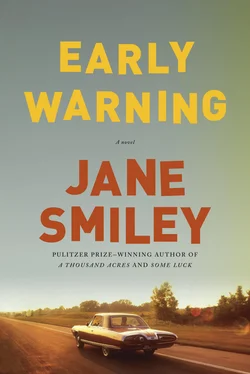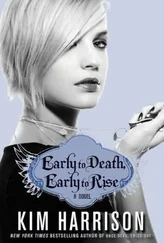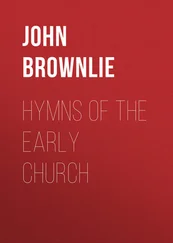Jane Smiley - Early Warning
Здесь есть возможность читать онлайн «Jane Smiley - Early Warning» весь текст электронной книги совершенно бесплатно (целиком полную версию без сокращений). В некоторых случаях можно слушать аудио, скачать через торрент в формате fb2 и присутствует краткое содержание. Год выпуска: 2015, Издательство: Knopf, Жанр: Современная проза, на английском языке. Описание произведения, (предисловие) а так же отзывы посетителей доступны на портале библиотеки ЛибКат.
- Название:Early Warning
- Автор:
- Издательство:Knopf
- Жанр:
- Год:2015
- ISBN:нет данных
- Рейтинг книги:5 / 5. Голосов: 1
-
Избранное:Добавить в избранное
- Отзывы:
-
Ваша оценка:
- 100
- 1
- 2
- 3
- 4
- 5
Early Warning: краткое содержание, описание и аннотация
Предлагаем к чтению аннотацию, описание, краткое содержание или предисловие (зависит от того, что написал сам автор книги «Early Warning»). Если вы не нашли необходимую информацию о книге — напишите в комментариях, мы постараемся отыскать её.
, a national best seller published to rave reviews from coast to coast.
Early Warning — читать онлайн бесплатно полную книгу (весь текст) целиком
Ниже представлен текст книги, разбитый по страницам. Система сохранения места последней прочитанной страницы, позволяет с удобством читать онлайн бесплатно книгу «Early Warning», без необходимости каждый раз заново искать на чём Вы остановились. Поставьте закладку, и сможете в любой момент перейти на страницу, на которой закончили чтение.
Интервал:
Закладка:
Frank didn’t care who won the nomination or the election. Kennedy was of interest to him as a young man still, a man the age of Lillian, a man who had lost many things and had plenty to lose. Bobby Kennedy had been transforming before his eyes lately — getting younger and younger, even as Frank and everyone he knew was getting older and older. Maybe that’s why Arthur’s colleagues hated him. Look at his recent pictures: he had never been as handsome, as tousled, as brilliant. Every so often, when an old picture popped up of Bobby and JFK, JFK looked exhausted in comparison.
Jim Upjohn liked Bobby Kennedy, both politically and personally. Jim had come around since JFK’s assassination, mostly because he thought Johnson was a Texas roughneck and Eugene McCarthy was wheels within wheels. Within wheels. He said that RFK might be too short to win the election, but he kept urging Frank to contribute — it would be good moral experience for Frank, such a tightwad. The thing Frank didn’t like about Kennedy was that he didn’t seem to be able to keep his feelings to himself, no matter what he actually said. When he worked for Joe McCarthy, when he went after Hoffa, when he walked beside his brother Jack, you could see him almost trembling with intention that was eating him alive. Several times over the years, Arthur and Frank had talked about Bobby the way you did about strange younger men, and not only because the Kennedys also lived in McLean and seemed to follow the Arthur Manning laissez-faire child-rearing program (once, Arthur heard through the grapevine that the daughter Kathleen had hired her own nanny when she was walking down the beach in Hyannis Port, and Ethel had interviewed her through the door while she, Ethel, was going to the bathroom). Arthur’s co-workers hated Kennedy, said that he made their skin crawl, that they recoiled from him as from anything small and poisonous.
In the crowded lobby, Frank felt edgy. His eye could not help going to the anomalous figures in the busy roomscape — a man here and a man across the room who were utterly still and utterly observant, who seemed unhappy amidst the rising zest of the crowd. They wore suits as if they were used to wearing suits; they were Frank’s age, and they knew too much to be swept up in the enthusiasm around them. Their eyes flickered sideways before they turned their heads, as if they were waiting for something. The crowd, by contrast, was moving in a kind of coordinated exuberance, heads tossed backward, mouths wide open in talk or in smiles, arms lifted, bodies lifted. Just the sort of crowd that thought it knew what was coming. Frank shivered and moved away from the bar. Probably, he thought, he would always be that kid he’d been in college, living in a tent beside the river, shooting rabbits to make a little money, that kid he’d been in the army, comfortable on a quiet morning, focusing his telescopic sight on a figure in the distance, watching it come to a halt, waiting for the quarry to stretch a little bit and yawn. That was when Frank had liked best to make a kill, at that moment of confidence and comfort. It was a mercy killing, in a way, and he’d done it carefully, so that a single shot finished the deed. The sniper units were trained never to fire a second time, never to give away their position, so Frank had made sure that no second shots were needed. He hadn’t thought about that in years.
Now Bobby appeared, surrounded by larger men — Frank recognized Rafer Johnson — and headed toward the podium. Frank’s edginess peaked in a kind of uncomfortable tingle. He finished his beer and turned away. Outside of the hotel, Wilshire was pretty empty. Even the whores were there, trying to get a glimpse of the next president. Frank found the car and drove around for an hour or two, still a man with nothing to lose, but newly aware of what he had lost — not only Lydia, but Andy, Janet, Eunice, Lawrence (who would have loved Bobby Kennedy).
It was at least three when he got to the Beverly Hills Hotel, where he had stayed for the last three nights and always did stay. The desk clerk was distracted; Frank didn’t understand why until he got to his room and turned on the TV. He sat on the corner of the bed in his shorts, watching the black-and-white panic. Was he the only person in America who was not surprised at the assassination of Bobby Kennedy — or, rather, surprised only that the shooter was that kid, who looked as dumbfounded and harmless as a fawn in the headlights?
—
WHEN SHE GOT HOME from Mount Holyoke in June, Debbie saw that her real summer job was organizing her mother and, once he got home, watching her dad, who was finishing up five months at Sheppard Pratt. She had to press her mother, even bully her, into naming his diagnosis — well, depression, yes, pretty severe, and, well, paranoia, too, though that was not something her mother had noticed, or maybe it was not something that her father had expressed. Apparently, there were people who seemed perfectly normal on the surface, and then you read their diaries or their letters and it was one long description after another of plots and plans. There had been shock treatments. Debbie quailed and didn’t ask how many. Lillian at last told Debbie about the suicide attempt, and then she told her about her grandmother, and then she told her about the first wife, during the war, and Debbie cried, but all of this was so new and strange that her grief was more or less like crying when a book was sad. She wrote about it to David.
When he got home, though, her father seemed fine enough. He wasn’t ready to go back to work, so he bought and read something called The Gourmet Cookbook , which was about five hundred pages long, and he went to the nursery for plants and bushes, which he and Mom discussed as if they were new puppies, and he oversaw the crew that came to trim some of the trees. At the bottom of the property, he broadcast some wildflower seeds that he got at a natural-history museum. He washed both cars. Debbie found herself counting jokes. If he made five jokes in a day or fewer, he wasn’t feeling very good, and if he made up to ten, he was okay, but if he made more than ten, he was acting “manic,” which was cause for worry. He didn’t watch the news or read the paper. Debbie wondered if he was the only person in the world who did not know about the assassination of Bobby Kennedy or the assassination of Martin Luther King. Her father would have been the perfect person to talk to about these events, but she couldn’t find a way. Her mother never said a word.
To David, who was caddying for the summer at a golf course in Middletown, she wrote, “It’s like a tomb around here. That’s the saddest thing. When we were kids, no one had as much fun as we did. We had the first television, we had the sandbox, and both a swing set and a rope hanging from a tree limb. We had more bikes than kids, because if my dad saw a bike for sale cheap, he would buy it in case some neighborhood kid didn’t have one. We had so many balls, neighborhood dogs would come over to play even when their kids didn’t. Dean keeps telling me to leave Dad alone and stop staring at him, that that’s what makes you paranoid!”
She thought she was handling everything pretty well, until she took a weekend and went up to Middletown Friday night, with a return ticket for Sunday afternoon. Mom had been willing to make her a reservation at a hotel. She said, “You’re almost twenty-one. When I was your age, Timmy was a year old and you were on the way. What you do is your business. I am not going to ask you how serious you are about him, or anything. Which is not something your grandmother said to me. Which is why I ran off with your father without telling her a word about it.” She smiled, but she still looked worn out. Debbie wasn’t in fact sure how serious she was about David, since he was more comforting than exciting, but she was eager to go.
Читать дальшеИнтервал:
Закладка:
Похожие книги на «Early Warning»
Представляем Вашему вниманию похожие книги на «Early Warning» списком для выбора. Мы отобрали схожую по названию и смыслу литературу в надежде предоставить читателям больше вариантов отыскать новые, интересные, ещё непрочитанные произведения.
Обсуждение, отзывы о книге «Early Warning» и просто собственные мнения читателей. Оставьте ваши комментарии, напишите, что Вы думаете о произведении, его смысле или главных героях. Укажите что конкретно понравилось, а что нет, и почему Вы так считаете.











